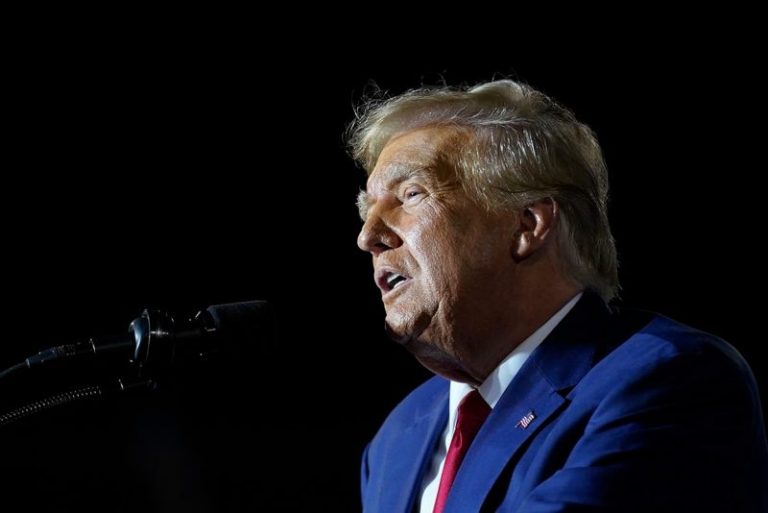Attorneys for Donald Trump have asked a federal judge in Washington to allow them to investigate several U.S. government agencies about their handling of investigations into him and allegations of voter fraud three years ago as the former president moves to defend himself from charges that he criminally conspired to subvert the results of the 2020 election.
In court papers filed Monday, Trump’s legal team sought permission to compel prosecutors to turn over information about the FBI, national security and election integrity units of the Justice Department, as well as the intelligence community and Department of Homeland Security’s response to foreign interference and other threats to the 2020 election, in what appeared to be an attempt to resuscitate his unfounded allegation that President Biden’s election victory was “stolen.”
Whether Trump genuinely believed that allegation may be a matter for trial, his lawyers wrote, but prosecutors cannot “suppress and withhold from President Trump information that supports this defense and related arguments regarding good faith and the absence of [his] criminal intent.” It was “certainly not criminal,” they added, “for President Trump to disagree with officials now favored by the prosecution and to rely instead on the independent judgment that the American people elected him to use while leading the country.”
Defendants in federal criminal cases typically can and often do file shotgun-blast requests for information in hopes of hitting something useful. However, courts give U.S. prosecutors broad discretion to decide which evidence reasonably may be helpful to the defense and thus must be turned over. Their obligation to produce evidence is also limited to information available to the prosecution team — not everything known to the U.S. government at large.
Even so, Trump’s demands in his historic prosecution go far beyond the typical. In more than 70 pages of legal motions and 300 pages of supporting exhibits, Trump lawyers, led by Todd Blanche and John Lauro, argued for wide leeway to compel special counsel Jack Smith’s prosecution team to turn over vast swaths of information. The defense’s 59 requests include the identification of “informants and other undercover operatives” in the Jan. 6, 2021, Capitol attack; information about security measures undertaken that day, assessments of cyberattacks and other actual or attempted interference in the election, among many other things.
Claiming that he is a victim of political persecution by the Biden administration because he is Biden’s primary 2024 rival, Trump’s lawyers also filed requests seeking any communication or “coordination” by the Justice Department with the Biden administration or family, including his son, Hunter. And they sought information about the Justice Department’s interactions with Trump’s vice president, Mike Pence, a key witness named in Trump’s indictment.
Pence, Trump’s defense suggested, could have been motivated to align his story with prosecutors’ desires because of classified documents found at his home by his lawyer months after an FBI search of Trump’s residence and the discovery of classified documents at Biden’s home in Delaware and a separate think tank office. The Justice Department closed its investigation of Pence in June without charges.
Trump, the front-runner for the 2024 Republican presidential nomination, has pleaded not guilty to an Aug. 1 indictment accusing him of plotting to undermine the federal government, obstruct Congress’s legitimate certification of the 2020 presidential election and disenfranchise American voters.
U.S. prosecutors allege than then-president Trump unleashed a flood of false claims about purported election fraud and used deceit and lies to get state, local and federal officials to overturn the results, culminating in the Capitol riot. “The attack on our nation’s Capitol on Jan. 6, 2021, was an unprecedented assault on the seat of American democracy,” Smith said when charges were brought. “It was fueled by lies, lies by the defendant.”
The case is one of four felony prosecutions facing Trump this year. The others include a Georgia state case similarly alleging that Trump tried to obstruct that state’s election results; a federal indictment in Florida over his alleged retention and mishandling of classified documents and obstruction after leaving the White House; and a New York state case accusing him of business fraud and covering up a hush money payment made during the 2016 election campaign.
Trump’s requests Monday are a legal long-shot. While his attorneys raised a baseless claim popular among his supporters — that the violence at the Capitol could have been the result of a “failed sting operation” by undercover government agents rather than Trump’s directions — no such evidence has been uncovered in hundreds of criminal cases adjudicated to date, for example. By comparison, to prevail on judges, defendants typically must show prosecutors have unreasonably delayed or refused to comply with obligations to turn over specific, relevant materials important to the defense.
Separately Monday, U.S. District Judge Tanya S. Chutkan denied an earlier Trump request to subpoena House members, the National Archivist, and attorneys for Biden and the Homeland Security Department in pursuit of purported “missing materials” related to a House committee that investigated the Jan. 6 Capitol attack.
The judge said the House Jan. 6 committee did not actually ship out to other agencies any materials under most of the categories sought by Trump, and ones they did have already been turned over by prosecutors to his defense.
For instance, Chutkan said, Trump’s defense sought video recordings in addition to written transcripts that it has already received of committee interviews, but failed to establish why it needed video to be able to challenge witness testimony.
The judge expressed skepticism about what she cast as Trump attorneys’ vague and catchall assertion of the importance and relevance of so-called “missing records” to the defense. “The broad scope of the records that Defendant seeks, and his vague description of their potential relevance, resemble less ‘a good-faith effort to obtain identified evidence’ than they do ‘a general “fishing expedition,’” that the law does not allow, Chutkan wrote.

